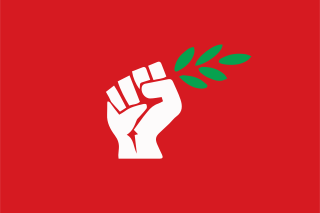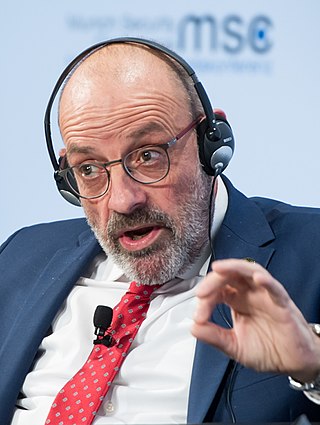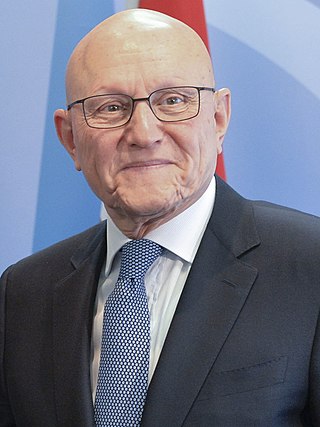Lebanon is a parliamentary democratic republic within the overall framework of confessionalism, a form of consociationalism in which the highest offices are proportionately reserved for representatives from certain religious communities. The constitution of Lebanon grants the people the right to change their government. However, from the mid-1970s until the parliamentary elections in 1992, the Lebanese Civil War (1975–1990) precluded the exercise of political rights.

Michel Naim Aoun is a Lebanese politician and former general who served as the 13th president of Lebanon from 31 October 2016 to 30 October 2022.

The Free Patriotic Movement is a Lebanese political party. Founded by Michel Aoun in 1994, the party is currently led by Aoun's son-in-law Gebran Bassil since 2015.

Fouad Siniora is a Lebanese politician. He served as the 12th prime minister of Lebanon from 2005 to 2009. He served as minister of Finance from 2000 to 2004.

The Future Movement is a Lebanese political party affiliated with the Sunni sect. The party was founded as a coalition in 1995 led by Rafic Hariri which was known as the Hariri Bloc but was officially founded in 2007. The party is led by Saad Hariri.
Major General Hassan Sabeh is a Lebanese politician and was the Interior Minister and Municipalities in the 2005-2009 cabinets of Prime Minister Fouad Siniora.
Along with the Amal Movement, Hezbollah is one of the two main parties representing the Shia community, Lebanon's largest religious bloc. Amal has made a commitment to carrying out its activities through political means, but remains a partial fighting force aiding Hezbollah when the need arises.

The March 14 Alliance, named after the date of the Cedar Revolution, was a coalition of political parties and independents in Lebanon formed in 2005 that were united by their anti-Assad regime stance and by their opposition to the March 8 Alliance. It was led by Saad Hariri, Walid Jumblatt and Samir Geagea, as well as other prominent figures.

Yacoub Riad Sarraf is a Lebanese politician. He was born in the town of Miniara in the Akkar district of northern Lebanon.

The 2006–2008 Lebanese protests were a series of political protests and sit-ins in Lebanon that began on 1 December 2006, led by groups that opposed the US and Saudi-backed government of Prime Minister Fouad Siniora and ended on 21 May 2008 with the signing of the Doha Agreement. The opposition was made up of Hezbollah, Amal, and the Free Patriotic Movement (FPM); a number of smaller parties were also involved, including the Marada party, the Lebanese Communist Party and the Syrian Social Nationalist Party. A majority of the members of the government were part of the anti-Syrian March 14 Alliance, a coalition of political parties and independents in Lebanon. The two groups were also divided along religious lines, with most Sunnis and Druze supporting the government, and most Shi'a supporting the opposition. The Christian community was split between the two factions, with Michel Aoun, the leader of the FPM, claiming to have more than 70% support among the Christians, based on the results of the 2005 parliamentary election.
The Beirut Arab University shooting happened on January 25, 2007, in the Beirut Arab University in the Lebanese capital.
Walid Eido was a member of the Future Movement, Lebanese political movement and a member of the Lebanese Parliament. He was also a member of the March 14 Coalition.

The Armenian Revolutionary Federation, also known simply as Tashnag, is an Armenian political party active in Lebanon since the 1920s as an official political party in the country after having started with small student cells in the late 1890s and early 20th century.

General elections were held in Lebanon on 6 May 2018. Although originally scheduled for 2013, the election was postponed three times in 2013, 2014 and 2017 for various reasons, including the security situation, the failure of the Parliament to elect a new President, and the technical requirements of holding an election. A new electoral law adopted in 2017 provides a proportional representation system for the first time.

Tammam Saeb Salam is a Lebanese politician who was the Prime Minister of Lebanon from February 2014 until December 2016. He also served as the acting President of Lebanon from May 2014 until October 2016 in his capacity as prime minister. He previously served in the government of Lebanon as minister of culture from 2008 to 2009.

The formation of a new government led by Tammam Salam followed two weeks of negotiations after the resignation of Najib Mikati's government. Salam's candidacy was backed by the March 14 Alliance, the Progressive Socialist Party, Najib Mikati and the Amal Movement.

A series of rounds in the Lebanese presidential election were held from 23 April 2014 until 31 October 2016. No candidate reached a two-thirds majority vote in the first round, and subsequent rounds failed to gain a quorum. Finally, in the second round of the forty-sixth session held on 31 October 2016, Michel Aoun, a Member of Parliament and formerly a disputed Prime Minister and Acting President in a rival government near the end of the Lebanese Civil War, was elected with 83 votes in Parliament. He took office the same day as the 13th President of Lebanon since independence in 1943.
The following lists events that happened in 2007 in Lebanon.

North II is an electoral district in Lebanon, as per the 2017 vote law. The district elects 11 members of the Lebanese National Assembly - 8 Sunni, 1 Alawite, 1 Greek Orthodox and 1 Maronite. The constituency contains three 'minor districts', Tripoli, Miniyeh and Danniyeh. The Tripoli 'minor district' elects 5 Sunnis, 1 Alawite, 1 Greek Orthodox and 1 Maronite parliamentarian, the Miniyeh 'minor district' elects 1 Sunni and the Danniyeh 'minor district' elects 2 Sunni parliamentarians.











